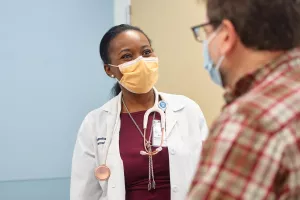Multiple sclerosis (MS) is a chronic inflammatory, immune-mediated disease affecting more than 1 million people in the US and 3 times more women and people assigned female at birth (AFAB). An MS diagnosis will transform your life, and we keep up with the latest medical advances so we can deliver cutting-edge treatments that help you live life to its fullest.
Understanding multiple sclerosis
We keep up with the latest medical advances so we can deliver cutting-edge treatments that help you live life to its fullest. MS occurs when the body mistakenly attacks its healthy tissue in the central nervous system (brain, spinal cord and optic nerves).
Typically appearing between ages 20 and 40, MS the body attacks the fatty, protective coating of insulation, called myelin, that forms around nerves in the brain and spinal cord. When myelin becomes damaged, the messages from your brain to the rest of your body have a more challenging time getting through, leading to symptoms of MS like muscle weakness and poor coordination.
Dr. Kristen Babinski describes Multiple Sclerosis.

Conditions
We know there is a lot of information to digest. We will educate you and your family about MS and your treatment plan. If necessary, we'll coach your family on how to care for you at home and help you acquire braces, walkers and wheelchairs. We can also provide parallel care for conditions like Neuromyelitis optica (Devic's disease), Sjogren's syndrome, lupus, central nervous system sarcoidosis or Lyme disease.
Everyone experiences the symptoms of MS differently, and they can vary from mild to severe or short- to long-term. Symptoms can even be exacerbated by illness, stress, fatigue and weather. You should call your doctor if you develop a new symptom or experience worsening symptoms. Symptoms of MS can include:
- Weakness
- Stiffness
- Numbness and tingling
- Vision problems
- Difficulty walking
- Cognitive changes
- Fatigue
- Bowel or bladder changes
- Sexual dysfunction
- Pain
- Depression
4 types of MS
RMS is the most common type of MS. Relapses are new or worsening symptoms lasting over 24 hours. A new lesion or lesions in the central nervous system typically cause relapses.
CIS is the first appearance of symptoms caused by the central nervous system attacking the myelin. Your symptoms likely do not result in an MS diagnosis, and you may or may not go on to develop MS.
Most patients with RMS will eventually transition to SPMS. In this phase, symptoms will gradually worsen over time.
PPMS is the least common form. Patients tend to be older at the start of MS symptoms and often have more damage to their spinal cord than their brain. PPMS patients skip the CIS phase and recovery and instead have increasing disability over time.
Testing
There is no single test to diagnose MS. Your doctor will review your medical history, look at previous MRI scans and any prior treatment related to your symptoms. Tests will help rule out other conditions with similar symptoms. Commonly we'll perform tests like:
- A neurological exam
- MRI of the brain and spinal cord
- Cerebrospinal fluid analysis (measures fluid in your brain and spine)
Treatments
The goal of treatment, particularly early in the course of the disease, is to prevent relapses and decrease long-term disability. And while there is no cure, promising new therapies have advanced the fight against MS, especially when diagnosed early. There are lots of treatments we can try. Your care plan is based on your unique needs and symptoms. We will discuss all the treatment options, side effects and safety.
Since MS can lead to other health problems, we work closely with different specialties, such as ophthalmology, urology, psychiatry and rehabilitation, to manage your overall well-being. Depending on the progression of your illness, you can expect to visit us about twice a year for evaluations.
MS symptoms could also be managed with treatments like medication and lifestyle changes, such as:
- Exercise
- Eating healthy foods
- Getting enough rest
- Do not smoke
FAQs
MS is a chronic inflammatory disease of the central nervous system (optic nerves, brain and spinal cord). It causes damage to the axons (nerve fibers) and myelin (fatty substance insulating the axons), resulting in vision loss, weakness, numbness, cognitive changes, fatigue, pain, depression, and difficulty walking.
While there is no cure for MS, many FDA-approved treatment options exist for relapsing MS. These therapies prevent new lesions from forming, thereby decreasing the frequency of relapses. The goal of treatment, particularly early in the course of the disease, is to prevent relapses and reduce long-term disability.
A complex interplay between genetics and the environment likely causes MS. It is thought to be triggered when a genetically susceptible individual is exposed to a particular environmental trigger. Over 150 genetic susceptibility loci that can increase the risk of developing MS have been. Specific environmental stimuli, such as low vitamin D levels, tobacco use, obesity, organic solvents, and previous infections, have been implicated in developing MS.
Symptoms of MS vary from person to person. They may include weakness, stiffness, numbness/tingling, vision problems, difficulty walking, cognitive changes, fatigue, bowel or bladder changes, sexual dysfunction, pain and depression. We spend time with each patient discussing any MS symptoms they may be experiencing. We then prepare strategies and prescribe medications to help minimize and overcome symptoms.
You should call your neurologist immediately if you have new MS symptoms. Sometimes symptoms you have experienced before may be worsened by illness, stress, fatigue, and weather. However, if you develop a new sign or one that has suddenly declined for no apparent reason, you may be experiencing a relapse and need to be evaluated.
Bring your medical records and all MRI scans (reports and images) to prepare for an appointment. Writing a timeline of your neurological symptoms, including any treatments, is valuable if you can.

From regular office visits to inpatient stays, find the healthcare you need and deserve close to home.

Meet the doctors and care team devoted to supporting you every step of the way along your path to better health.